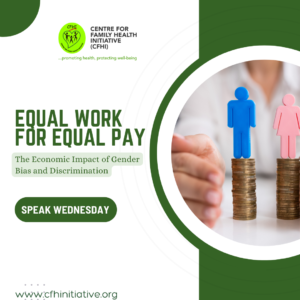Gender bias and discrimination are deep-rooted issues in many workplaces around the world. One of the most visible ways these problems show up is through the gender pay gap. This means that women often earn less than men for doing the same work. Despite growing awareness and advocacy, women in Nigeria, like in many other parts of the world, still face significant pay disparities. These differences in pay have wide-reaching effects, not just on individuals but on businesses and the broader economy.
Women frequently occupy lower-paying roles in fields like services and education, while men dominate higher-paying positions in areas such as engineering and finance. The impact of this pay gap goes beyond individual earnings. When women feel they are being treated unfairly, their job satisfaction and productivity can suffer. If they are not getting paid equally for their work, they might feel less motivated and engaged. Research has shown that when companies address these pay gaps and ensure fairness, employees are more satisfied and work harder, which can boost overall business performance.
Moreover, the economic impact extends to families and the nation. Many women in Nigeria are heads of households, and lower wages mean they face greater financial challenges, affecting their access to essential services like healthcare and education. According to the International Labour Organization (ILO), the gender pay gap worsens poverty levels and limits access to crucial resources such as education and healthcare for women and their families. Research from McKinsey & Company also indicates that closing the gender pay gap could significantly reduce poverty and improve living standards.
On a larger scale, addressing the pay gap could benefit the economy. Equal pay would enable women to contribute more effectively, boosting consumer spending and economic productivity. Companies with equitable pay practices also perform better financially, showcasing the broader benefits of addressing gender bias.
Nigeria has laws aimed at promoting equal pay, but enforcement remains a challenge due to cultural biases and systemic barriers. To make real progress, organisations need to regularly review pay practices, promote transparency, and support women’s career advancement. Offering flexible work options and encouraging fair salary negotiations can also help mitigate biases related to caregiving responsibilities.
In conclusion, tackling the gender pay gap is crucial for a nation’s economic and social progress. Ensuring equal pay for equal work benefits everyone—individuals, businesses, and the economy. Addressing these disparities is a crucial step toward creating a more just and inclusive society.
Speak Wednesday is an initiative of CFHI to address issues around gender-based violence and gender bias.
#SpeakWednesday #InternationalEqualPayDay #EqualPay #WomenEmpowerment #EqualityForAll #GenderEquality #GenderBias
References:
– McKinsey & Company. (2020). Diversity Wins: How Inclusion Matters. Retrieved from [McKinsey Report] (https://www.mckinsey.com)
– International Labour Organization. (2018). Global Wage Report 2018/19: What Lies Behind Gender Pay Gaps? Retrieved from [ILO Report] (https://www.ilo.org).
– World Economic Forum. (2023). Global Gender Gap Report 2023. Retrieved from [World Economic Forum] (https://www.weforum.org).
– Catalyst. (2022). The Bottom Line: Connecting Corporate Performance and Gender Diversity. Retrieved from [Catalyst] (https://www.catalyst.org).
– McKinsey Global Institute. (2015). The Power of Parity: How Advancing Women’s Equality Can Add $12 Trillion to Global Growth. Retrieved from [McKinsey Global Institute] (https://www.mckinsey.com).


